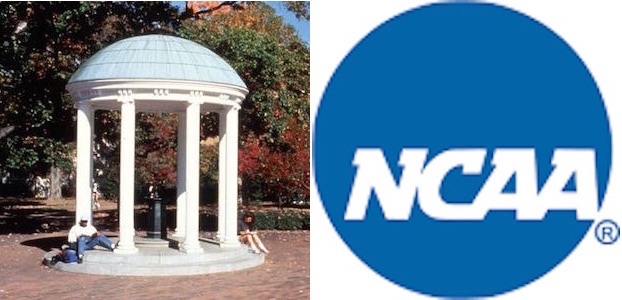The University of North Carolina publicly released its Notice of Allegations from the NCAA on Thursday — 13 days after initially receiving the documentation from the collegiate athletics governing body.
In all, the University was hit with five allegations — all of which are deemed severe in nature (Level I) by the NCAA’s code of enforcement. The fifth and final allegation included the dreaded ‘Lack of Institutional Control’ that is often deemed as the most damning charge of all in NCAA cases.
Listed below are the five allegations levied against UNC, along with some basic explanation as to what the allegations mean, and what the NCAA is claiming UNC did to violate their rules.
Allegation 1: The institution provided impermissible benefits by allowing 10 student-athletes to take independent study courses beyond the allowable 12-hour limitation.
What Does It Mean? The NCAA is stating that by allowing these student-athletes to take more independent study courses than the 12 hours allowed by typical University policy applicable to graduation, they were provided an extra benefit that wasn’t accessible to regular students.
Allegation 2: Jan Boxill, former UNC philosophy instructor, director of the Parr Center for Ethics, women’s basketball counselor in the Academic Support Program for Student-Athletes (ASPSA) and chair of the faculty, committed major violations in the form of improper academic assistance and special arrangements to women’s basketball student-athletes.
What Does It Mean? The NCAA is stating that by assisting in the completion of student work and recommending a grade for a paper, Mrs. Boxill was providing an extra-benefit to UNC women’s basketball players that wasn’t accessible to regular students.
Allegation 3: Deborah Crowder, former student services manager in the Department of African-American Studies (AFAM), failed to furnish information requested by the NCAA investigators, and refused to be interviewed.
What Does It Mean? In simplest terms, the NCAA is saying that Crowder didn’t cooperate with their investigation. She refused to be questioned by the NCAA enforcement staff, and failed to provide information as requested by the investigators.
Allegation 4: Julius Nyang’oro, former head of the African-American Studies Department, failed to furnish information requested by the NCAA investigators, and refused to be interviewed.
What Does It Mean? Essentially the same thing as Allegation 3. The NCAA is stating that Mr. Nyang’oro didn’t cooperate with their investigation.
Allegation 5: UNC’s failure to monitor the activities of Jan Boxill and the African-American Studies department constitutes a Lack of Institutional Control.
What Does It Mean? This is the big one, as far as potential NCAA sanctions are concerned. Lack of institutional control is considered quite possibly the most severe infraction that any institution can have, because it implies that the institution itself is not monitoring major infractions and taking proactive steps to avoid major infractions.
Numerous individuals — numbering well into the hundreds — who may have been contacted or questioned as part of the NCAA’s investigation, but aren’t subjects of the actual investigation itself, had to be notified, and their names redacted, before the Notice of Allegations was to be released. This is why it took nearly two weeks from the time UNC received the NCAA’s Notice of Allegations, and when it was made public.
There were also FERPA concerns as far as protecting academic records and specific students that may have been part of the NCAA’s inquiry. This was the process that took up much of the time between the University receiving the official Notice of Allegations May 22, and its public release on Thursday.
UNC has 90 days to respond to the NCAA’s Notice of Allegations.
As they did back when the Tar Heel football program was under NCAA investigation back in 2011, the University will formally respond. Given the 90-day time frame, the likeliest scenario is that UNC will be making its formal response to the NCAA sometime in mid to late August.
Director of Athletics Bubba Cunningham confirmed in an interview shortly after the public release of the NCAA Notice of Allegations that UNC would likely use almost all of the 90-day window to prepare its response.
Realistically, the process will almost certainly push into 2016 considering the timeframe from when UNC formally responds to the allegations, and any subsequent action from the NCAA.
As in 2011 with the football program, the University may be requested to return to Indianapolis for a meeting in front of the NCAA Committee on Infractions. That meeting could be in the early fall, such as September or October, but it’s speculation to suggest exactly when that step will come.
Sources close to the situation have informed ACCSports.com that UNC is expected to challenge the Lack of Institutional Control charge.

















